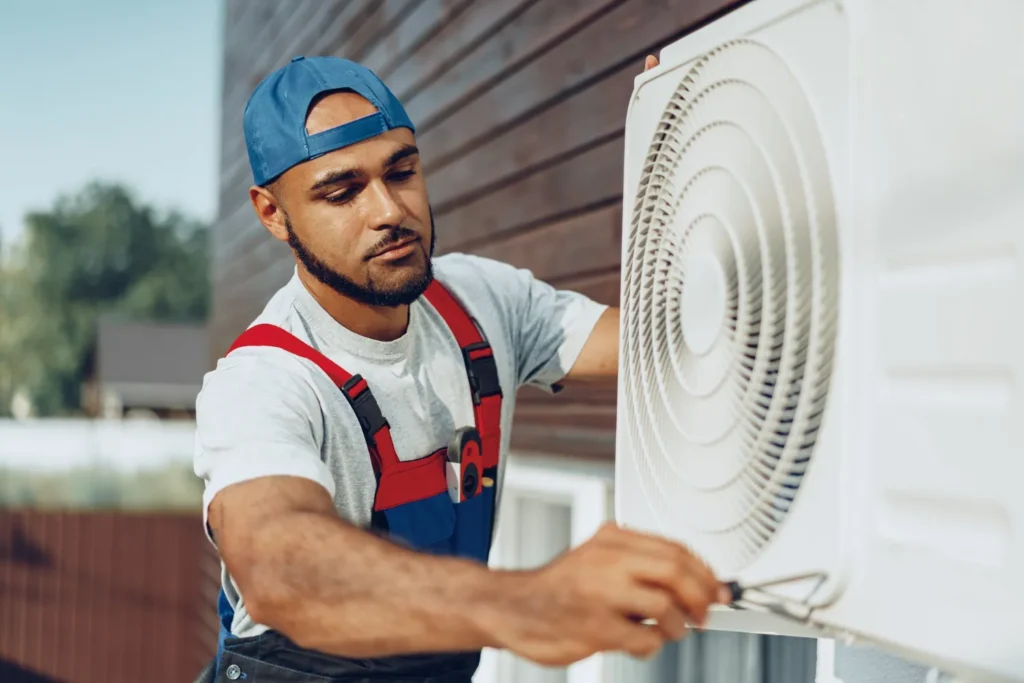DIY enthusiasts! Ready to take your AC unit maintenance into your own hands? Look no further! In our step-by-step guide, we’ll walk you through the process of DIY cleaning AC unit, ensuring cleaner air and better performance for your home. Say goodbye to dusty filters and inefficient cooling – with our easy-to-follow instructions, you’ll be on your way to a happier, healthier HVAC system in no time. So, grab your gloves and let’s get started on transforming your AC unit from drab to fab!
Table of Contents
Learn How to Clean Your Air Conditioning Unit by Yourself
Welcome to our comprehensive guide on DIY cleaning for your air conditioning (AC) unit, presented by 75 Degree AC, your trusted HVAC experts. In this guide, we’ll empower you with the knowledge and skills to maintain your AC unit, ensuring optimal performance and efficiency. Let’s dive in and learn how to clean your air conditioning unit like a pro!
Why is it Important to Clean Your Air Conditioner Regularly?

1. Performance and Efficiency
Your air conditioner works hard to keep your home cool, but over time, dirt, dust, and debris can accumulate within the unit, hindering its performance. A dirty AC unit struggles to cool your home efficiently, leading to increased energy consumption and higher utility bills. By cleaning your AC unit regularly, you can ensure optimal performance and efficiency, allowing it to cool your home effectively while minimizing energy usage.
2. Indoor Air Quality
In addition to cooling your home, your AC unit plays a crucial role in maintaining indoor air quality. A dirty AC unit can harbor allergens, dust mites, mold, and other pollutants, which are then circulated throughout your home. This can lead to poor indoor air quality and exacerbate respiratory issues such as allergies and asthma. By cleaning your AC unit regularly, you can remove these contaminants and improve the air quality in your home, creating a healthier environment for you and your family.
3. Costly Power Bills and Price of Repairs
Neglecting to clean your AC unit can result in higher energy bills and costly repairs. When dirt and debris accumulate within the unit, it restricts airflow and causes the system to work harder to cool your home. This increased workload not only leads to higher energy consumption but also puts added strain on the components of your AC unit, leading to premature wear and tear and potentially costly repairs. By cleaning your AC unit regularly, you can prevent these issues, saving money on energy bills and avoiding expensive repairs.
How to Clean a Window Air Conditioner
Cleaning a window air conditioner is a vital part of ensuring its optimal performance and longevity. Follow these step-by-step instructions to effectively clean your window AC unit:
- Turn Off and Unplug: Before starting any cleaning procedures, make sure the unit is turned off and unplugged from the power source to prevent accidents.
- Remove the Front Panel: Most window AC units have a removable front panel or grille. Carefully remove it to access the filter and interior components.
- Clean the Filter: The filter is the first line of defense against dust and debris. Depending on the type of filter your unit has, you can either vacuum it or rinse it with water to remove dirt and debris. If it’s particularly dirty, consider replacing it with a new one.
- Wipe Down Interior Surfaces: Use a damp cloth to wipe down the interior surfaces of the unit, including the fan blades and evaporator coils. Be gentle to avoid damaging any delicate components.
- Clean the Condenser Coils: The condenser coils are located at the back of the unit. Use a soft brush or coil cleaner to remove any dirt or buildup. Be careful not to bend or damage the coils in the process.
- Allow to Dry and Reassemble: Once you’ve cleaned all the components, allow them to dry completely before reassembling the unit. Once reassembled, plug it back in and turn it on to ensure everything is working correctly.
How to Clean an Outside AC Unit
Cleaning the outside AC unit, also known as the condenser unit, is essential for maintaining optimal airflow and efficiency. Follow these steps to clean your outside AC unit:
- Turn Off the Power: Locate the disconnect box near the unit and switch off the power to prevent accidents.
- Remove Debris: Inspect the exterior of the unit for any debris, such as leaves, branches, or dirt. Use gloves to remove any obstructions that may be blocking airflow.
- Clean the Fins: The fins on the outside of the unit can become clogged with dirt and debris, restricting airflow. Use a soft brush or vacuum cleaner to gently clean the fins, being careful not to bend or damage them.
- Spray with Water: Using a garden hose, spray water through the fins from the inside out to remove any remaining dirt or debris. Be careful not to use high-pressure water, as it can bend the fins or damage the coils.
- Straighten Bent Fins: If you notice any bent fins, use a fin comb to straighten them out, ensuring proper airflow.
- Clean the Surrounding Area: Trim any vegetation or foliage around the unit to maintain adequate airflow and prevent debris buildup.
- Restore Power and Monitor: Once the unit is clean, restore power at the disconnect box and monitor its operation to ensure everything is working correctly.
By following these simple steps, you can effectively clean both your window air conditioner and outside AC unit, ensuring they operate efficiently and keeping your home cool and comfortable all summer long.
Frequently Asked Questions
Here are answers to some of the most common questions about cleaning your air conditioning unit:
How Do I Get Rid of Mold in My Air Conditioner?
To remove mold from your air conditioner, mix equal parts water and vinegar and spray the affected areas. Allow the solution to sit for several minutes before wiping it away with a damp cloth. Ensure the unit is thoroughly dry before turning it back on to prevent mold regrowth.
What Can You Use to Clean the AC Coil?
You can clean the AC coil using a commercially available coil cleaner or a mixture of mild detergent and water. Spray the cleaner onto the coils and allow it to sit for a few minutes before rinsing it off with water. Be sure to follow the manufacturer’s instructions for best results.
How Often Should I Clean My Air Conditioner?
Ideally, you should clean your air conditioner at least once a year, preferably before the start of the cooling season. However, if you live in a dusty or humid environment, more frequent cleaning may be necessary to maintain optimal performance.
How Do You Know If Your AC is Clogged?
Signs of a clogged air conditioner include reduced airflow, uneven cooling, strange odors, and higher-than-normal energy bills. If you notice any of these symptoms, it’s essential to clean your AC unit to restore proper airflow and efficiency.
Do You Need to Clean the Condenser Coil?
Yes, cleaning the condenser coil is crucial for maintaining the efficiency of your air conditioner. Dirty coils can restrict airflow and cause the system to work harder, leading to increased energy consumption and potential damage to the compressor. Regular cleaning can help prevent these issues and prolong the life of your AC unit.
Can I Clean My AC Unit Myself?
Yes, you can clean your AC unit yourself, but it’s essential to follow proper safety precautions and techniques to avoid damaging the unit. If you’re unsure or uncomfortable performing the task, it’s best to hire a professional HVAC technician to ensure the job is done correctly.
What is the Best Thing to Clean Your AC Unit With?
A mixture of mild detergent and water or a commercially available coil cleaner is suitable for cleaning your AC unit. Avoid using harsh chemicals or abrasive cleaners, as they can damage the unit’s components. Be sure to read and follow the manufacturer’s instructions for any cleaning products you use.
Is it OK to Spray Water on Your Air Conditioner While Running?
No, it’s not advisable to spray water directly on your air conditioner while it’s running. Doing so can damage the electrical components and potentially cause injury. Always turn off the unit and unplug it before cleaning or performing maintenance.
Can I Hose Off My Outside AC Unit?
Yes, you can use a garden hose to rinse off the outside AC unit, but be sure to turn off the power to the unit first. Avoid using high-pressure water, as it can bend the fins or damage the coils. Additionally, be mindful of any nearby electrical components to prevent accidents. Regularly hosing off your outside AC unit can help remove dirt and debris, maintaining optimal airflow and efficiency.
Get Your Air Conditioning Unit Cleaned
For professional air conditioning unit cleaning services, trust the experts at 75 Degree AC. Our licensed technicians specialize in thorough cleaning and maintenance to keep your AC unit running efficiently and effectively.
Regular cleaning of your air conditioning unit is essential for optimal performance, energy efficiency, and indoor air quality. Whether you have a window unit or an outside AC unit, our team has the expertise and equipment to ensure every component is meticulously cleaned and inspected.
Don’t let a dirty AC unit compromise your comfort and health. Contact 75 Degree AC today at (713)-598-2737 or email us at 75degreeacservices@gmail.com to schedule an appointment. Let us help you beat the heat and enjoy a cool, comfortable home all year round.




